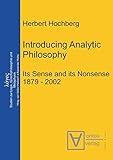Introducing Analytic Philosophy / Herbert Hochberg.
Material type: TextSeries: Logos : Studien zur Logik, Sprachphilosophie und Metaphysik ; 3Publisher: Berlin ; Boston : De Gruyter, [2013]Copyright date: ©2003Description: 1 online resource (280 p.)Content type:
TextSeries: Logos : Studien zur Logik, Sprachphilosophie und Metaphysik ; 3Publisher: Berlin ; Boston : De Gruyter, [2013]Copyright date: ©2003Description: 1 online resource (280 p.)Content type: - 9783110320534
- 9783110320763
- 100
- online - DeGruyter
- Issued also in print.
| Item type | Current library | Call number | URL | Status | Notes | Barcode | |
|---|---|---|---|---|---|---|---|
 eBook
eBook
|
Biblioteca "Angelicum" Pont. Univ. S.Tommaso d'Aquino Nuvola online | online - DeGruyter (Browse shelf(Opens below)) | Online access | Not for loan (Accesso limitato) | Accesso per gli utenti autorizzati / Access for authorized users | (dgr)9783110320763 |
Frontmatter -- PREFACE -- CONTENTS -- INTRODUCTION -- CHAPTER 1 THE LINGUISTIC TURN -- CHAPTER 2 DESCRIBING AND DENOTING -- CHAPTER 3 MEANING, TRUTH AND ANTI-REALISM -- CHAPTER 4 FACTS, INTENTIONS AND ABSTRACTION -- REFERENCES -- Index
restricted access online access with authorization star
http://purl.org/coar/access_right/c_16ec
Philosophy took a "linguistic turn" in the twentieth century that was marked by the focus on theories of meaning, reference, description, predication and truth. Starting with the roots of the analytic tradition in Frege, Meinong and Bradley, this book follows its development in Russell and Wittgenstein and the writings of major philosophers of the analytic tradition and of various lesser, but well known and widely discussed, contemporary figures. In dealing with basic issues that have preoccupied analytic philosophers in the past century, the author notes how analytic philosophy is sometimes transformed from its original concern with careful and precise formulations of classical issues into the dismissal of such issues and the resultant spinning of intricate verbal webs, often signaling the rebirth of idealism in the guises of "contextualism" and "anti-realism." The book thus examines the change that came to dominate the analytic tradition by a shift of focus from the world, as what words are about, to a preoccupation with language itself.
Issued also in print.
Mode of access: Internet via World Wide Web.
In English.
Description based on online resource; title from PDF title page (publisher's Web site, viewed 28. Feb 2023)


